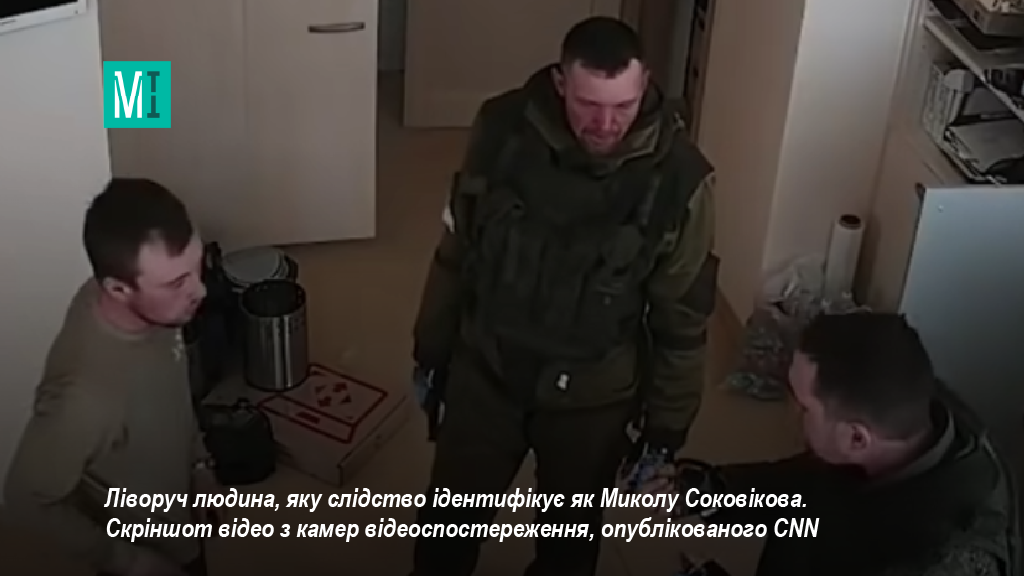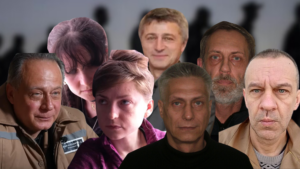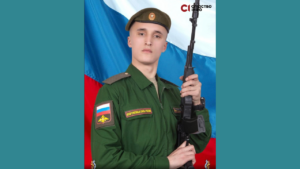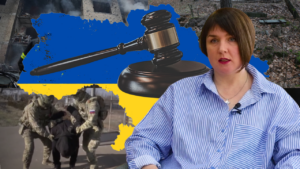12 shots in the back: the court questioned the witnesses and aggrieved in the case of civilians’ shooting in Kyiv Region

In March, two Russian military shot two civilians near Mriya Village in Kyiv Region. They were shooting in the back of unarmed men they had supposedly let go. One died on the spot, and the other got to the security booth, but he did not survive either. The two men took at least 12 shots.
That is one of the crimes committed by Russians during a month of their occupation of Kyiv Region. It was seen due to the video recording from surveillance cameras. A trial in absentia was started against Mykola Sokovikov, one of the accused, as the serviceman is in Russia. The witness, a Russian contract military, who recognized him on the video, was taken captive.
On June 26, Kyiv Sviatoshyn Court of Kyiv Region completed the questioning of the witnesses and aggrieved in this case. The charge is based on Article 438 of the Criminal Code of Ukraine, which is a violation of the rules and customs of war. A premeditated murder by prior conspiracy is a war crime with which Sokovikov, a 27-year-old lieutenant of a tank brigade of the RF Armed Forces, is charged. As the judges were busy with other cases, it took three sessions to question two witnesses and three family members of the killed men, who are the victims in this case: June 8, 19, and 26. The MIHR journalists follow the case and tell about the testimonies.
Witness from a POW camp
— Witness, the first question to you. What is your current status in Ukraine?
— I am in captivity. Zakhid 1.
— Are you a prisoner of war?
— Yes, I am.
Zakhid 1 is a camp for Russian POW in Lviv Region. That is where Erdeni Ukhinov, a 23-year-old contract serviceman from Ulan-Ude, gives evidence. It is impossible to see him well on the small screen: the light from the window falls in such way that Ukhinov turned to a dark shape in the video. With the assistance of an interpreter from Ukrainian into Russian, he takes his oath, to tell the truth to the court and answers the prosecutor’s questions.
Ukhinov is the prosecution’s witness, i.e., he can confirm or deny charges against Sokovikov. On February 24, 2022, his tank battalion crossed the border of Ukraine from Belarus and entered Kyiv Region by way of Chornobyl. Ukhinov told the court that he had stayed near Buzova and Berezivka Villages. And he knew that Sokovikov was at a distance of five kilometers from him, in the direction of Kyiv.
— I did not see him in Ukraine. I only saw him in the Belarus Republic, — tells Ukhinov to the court. The last time he met Sokovikov was March 30 of last year.
The Ukrainian investigators showed Ukhinov the video from the surveillance cameras, where the moment of the civilians’ killing is seen. During the pre-trial investigation, Ukhinov recognized Sokovikov in the video. Ukhinov says that he himself had been neither the direct witness nor the participator of the crime.

The territory of the enterprise and the van in which the Russian military came. Source of the photo: General Prosecutor’s Office
The footage has the marking: March 19, 2022. On that day, five Russians came to an enterprise in Bucha District on Zhytomyr Highway. There is a letter V and the inscription “Special Tank Forces RUS” on their white van. Two civilian men with their hands up went out to them, having seen the Russians via their surveillance cameras. Those were the owner and the guard of the enterprise. Their family members do not want publicity, so we do not tell them their names.

Screenshot from the surveillance camera. Source of the photo: National Police
The Russian military searched the men and checked their documents. After that, they supposedly let them go, but as soon as the men walked several meters away, the Russians opened fire on their backs. There were at least 12 shots. The owner died on the spot. The guard died of blood loss when he reached his booth. According to the investigators, Lt. Sokovikov was one of those who were shooting. Under Part 2, Article 438 of the Criminal Code of Ukraine, “Violation of the Rules and Customs of War”, he faces 10 to 15 years or life imprisonment.
“There was nobody to save anymore”
The other witness of the prosecution is a volunteer who came to the crime scene almost right away. He is a member of a fast response group in a volunteer formation of the territorial community. On that day, his commander received the guard’s call from the owner’s phone. The guard asked for help. Together with the AFU, the volunteers went to the enterprise.
— We opened the wicket and saw three men in the Russian military uniform, some of the AFU shouted: “Give up, we’ll shoot!”. A gunfight ensued. We heard the sound of a coming APC, so we retreated — clearly and calmly tells the man in the court.
The Ukrainian military came back to the enterprise in about an hour. They entered the premises from the other side. According to the volunteer, “there was nobody to save anymore.”
— One was lying near the gates at the road, and the other one was in the security booth. He had just bled out… When we loaded him, the blood was still warm…
The white van in which the Russians had come was found, damaged in the shootout, nearby on the road.
“He wanted to preserve his property”
The family members of the killed owner were in the status of victims in court. They and the lawyer of the accused asked not to take pictures or videos of them, so we do not tell any details about them. In court, they told that after the start of the full-scale invasion by Russia, the man stayed at the enterprise as “he wanted to preserve his property.” He was afraid of looting.
Before March 19, Russians would appear in the vicinity: they would pass along the highway and shoot at the building but did not enter the premises. The owner’s relatives say that there were no military sites, nor checkpoints, nor troops there. On the day of the murder, the man was in plain clothes: black jeans and a coat could not have been taken for military camouflage. That is important for the proof of guilt.
Another relative of the company owner talked to the wounded guard by phone shortly before his death. He phoned the enterprise owner, but it was the guard who responded. He had stayed at the enterprise after the start of the invasion because his home village had already been occupied. The man recounts their last talk:
— He told me that he had hard time talking because he was wounded and had to save his strength. He said that they (Russian military, — MIHR) had asked them something. But he did not specify what questions had been asked. Then they told them: “That’s it, you are free.” And when they began to move away from the military, he heard a machine gun fire and a shout, and he fell down. Then he fainted.
The video shows that the guard talked by phone to several people. He tried to bind his wounds, but he did not manage to do that and died of blood loss.
On June 26, upon completion of the victims’ questioning, the court started to investigate the evidence of the prosecution and to study the written documents. The court will start the sessions in July with studying the video of the crime scene. It lasts for about two hours.

Iryna Domashchenko, Journalist, MIHR
Translated from Ukrainian by Olena Balatska








